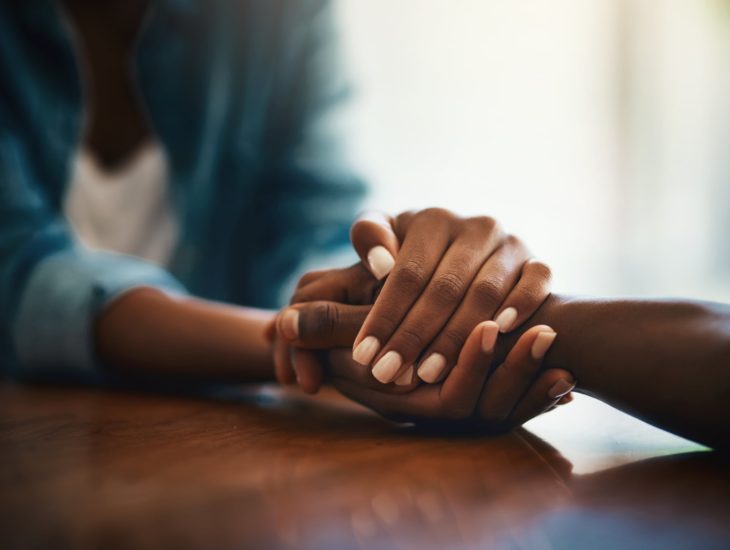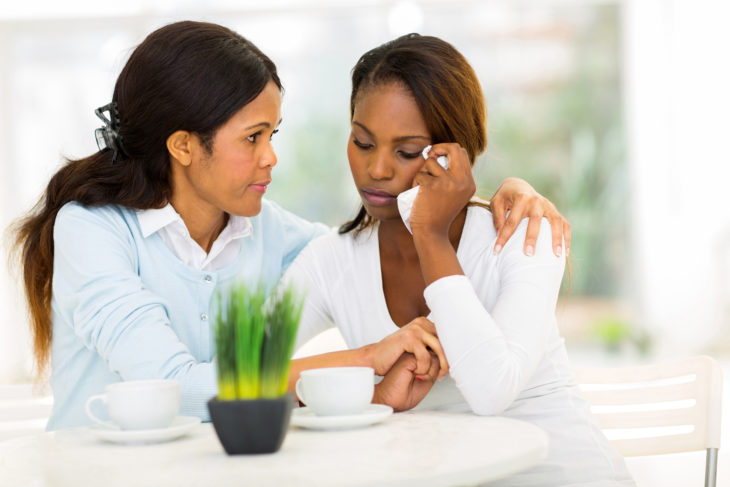“Why does she stay?” is the question most often asked when we hear about someone involved in an abusive relationship. Unfortunately, it’s also one of the least helpful things you can say to a woman caught up in this cycle. So what can we do to help when we suspect a friend is being battered?
Several years ago, project manager Jenny found herself in that position when she noticed a new friend was covered in bruises. “I told her flat-out that I had seen the bruises and that I was concerned,” Jenny says via email. “I told her that I didn’t know if she needed help or someone to talk to, but that she could call me any time, day or night.”
Jenny confided that she too was a survivor of domestic abuse and was blown away that only after she’d escaped her abuser did friends come forward to tell her how much they’d loathed her husband. “No one said anything when I was in it and needed help—so that was why I was speaking up.”

Source: popsugar
The most important thing you can do for a friend in a terrible situation is to let her know that you’re a safe person for her to confide in. One of the most insidious things abusers do is cut their partners off from friends and family. It’s easy to stomp off in a huff if a friend doesn’t return a few phone calls or emails, but realize that if it’s a friend who’s being battered, she either might not have the option to get back to you, or be too embarrassed to do so. Keep trying. Respect her boundaries, but make sure she knows you’re there.
I called Kimberlina Kavern, a director at Safe Horizon, the nation’s leading victim assistance program, to get her thoughts on the matter.
“Tell your friend that if there’s anything going on that she wants to talk about, that you are a non-judgmental, supportive friend,” Kim suggests. Hear that? Put away the Judge Judy robes. Never mind what you would do in her situation—until you’ve been there, you have no idea.
“We always recommend trying to connect survivors with a professional DV advocate,” Kim advises. Safe Horizon is such an advocate, providing everything from legal assistance to counseling to safe shelter, to locksmiths who’ll help secure their home once an order of protection has been obtained.
A safety plan is extremely important, as victims often need to escape in a hurry. You can help by offering her a place to store an extra set of clothes and any cash she can scrounge (financial abuse is a biggie with batterers). If you have an old cell phone lying around, give it to her. Even if it’s not in service, it’ll dial 911. Also suggest she make copies of important documents, like bank account information, social security cards, birth certificates and passports. But again, you should suggest, not demand. This is about helping your friend regain power over her life—it’s not an opportunity for you to run it.

Source: everydayfeminism
Make no mistake—being a good friend to a battered woman isn’t always easy. Watching her go home to a man who treats her badly can be very frustrating—sometimes infuriating, even. But it’s important to always remember your priority in this situation—your friend. “It’s normal to have those feelings of frustration and to maybe take on some of what your friend’s going through,” Kim says. “But it’s important to not express that to your friend.” Vent to your shrink, a trusted friend, a parent—but realize that if dealing with you makes her feel more ashamed about her situation, it’ll only drive her deeper into the closet.
The battered woman in Jenny’s life eventually divorced her husband, but no thanks to their mutual friends. “People kept getting annoyed with me for ‘interfering,’” she recalls. Incredibly, Jenny was even called a snob by one friend who accused her of forcing her “feminist values” on an uninterested party! Jenny says, “My frustration, in the end, wasn’t with her, but with other people who wouldn’t help and were judging me for helping.”
Original by: Judy McGuire
